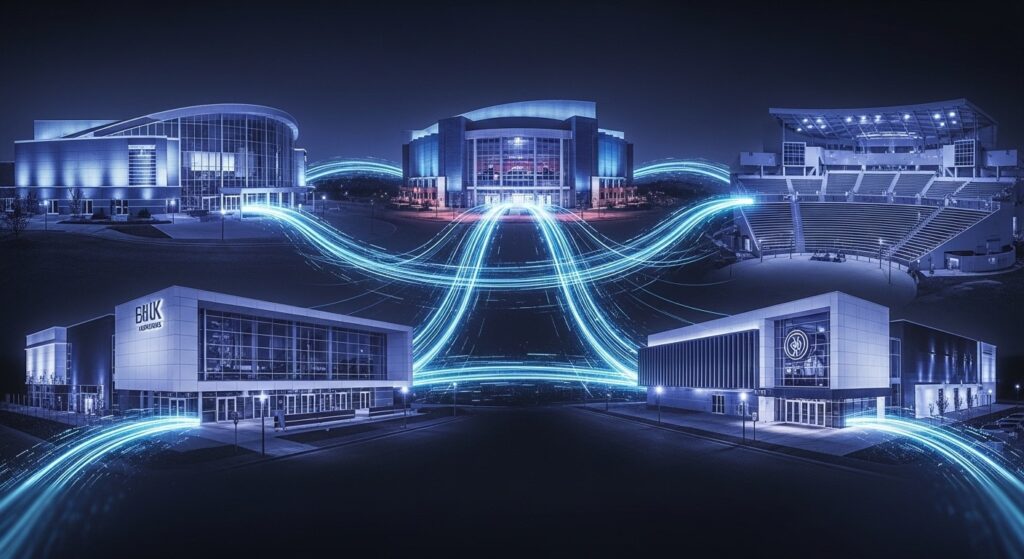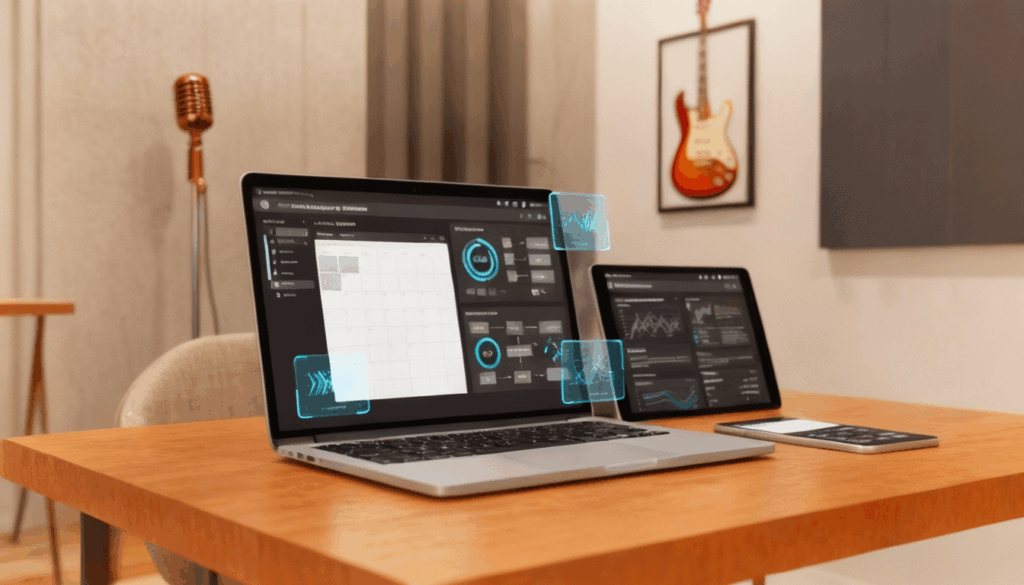
Top Music Manager Software Solutions in 2025
The music industry is experiencing explosive growth with $36.71 billion in projected revenue for 2025, but many managers still juggle spreadsheets, emails, and disconnected systems to book tours and track deals.
- Modern music management software centralizes booking, financial tracking, and team coordination in one platform
- Integration capabilities with ticketing, accounting, and marketing tools create powerful tech stacks
- Mobile-first solutions enable real-time management from venues, airports, and backstage
- Advanced analytics and automated workflows eliminate manual tasks that drain productivity
Stop wrestling with outdated systems. The right software transforms chaos into a competitive advantage.
The live music industry has roared back stronger than ever. Concert attendance hit record numbers in 2024, with major stadium tours becoming the norm rather than the exception. Yet behind every successful tour, festival, and venue booking lies a manager drowning in the same old chaos we’ve dealt with for years.
Music managers coordinate more moving parts than ever before. Tour routing, venue negotiations, deal tracking, financial settlements, team communications, and real-time logistics demand better tools. The days of managing multi-million-dollar operations through your email inbox are over. Professional music manager software has become essential for staying competitive.
What Makes Music Manager Software Essential in 2025?
Industry revenue grew 25% in 2023 alone, reaching over $33 billion globally. This growth creates both opportunity and operational nightmares for managers still using legacy systems.
Tour announcements trigger instant ticket sales. Venue availability changes hourly. Artist demands evolve constantly. Manual processes collapse under this pressure, leading to missed opportunities, booking conflicts, and financial errors that can torpedo careers.
Despite strong demand, touring costs have skyrocketed while grassroots venues close at alarming rates. Artists face mounting visa costs, equipment shortages, and logistical nightmares. Meanwhile, managers are still trying to coordinate everything through a dozen different apps that don’t talk to each other. Nearly three-quarters of professionals report feeling overwhelmed by constant app-switching just to get through their daily tasks.
When remote work became standard, virtual events exploded and hybrid touring models emerged. These changes made robust software non-negotiable for competitive operations.
What Key Features Should Every Music Manager Software Include?
Not all music manager software offers the same value. The difference between basic calendar apps and professional-grade platforms comes down to these essential features that actually matter for managing tours and venues.
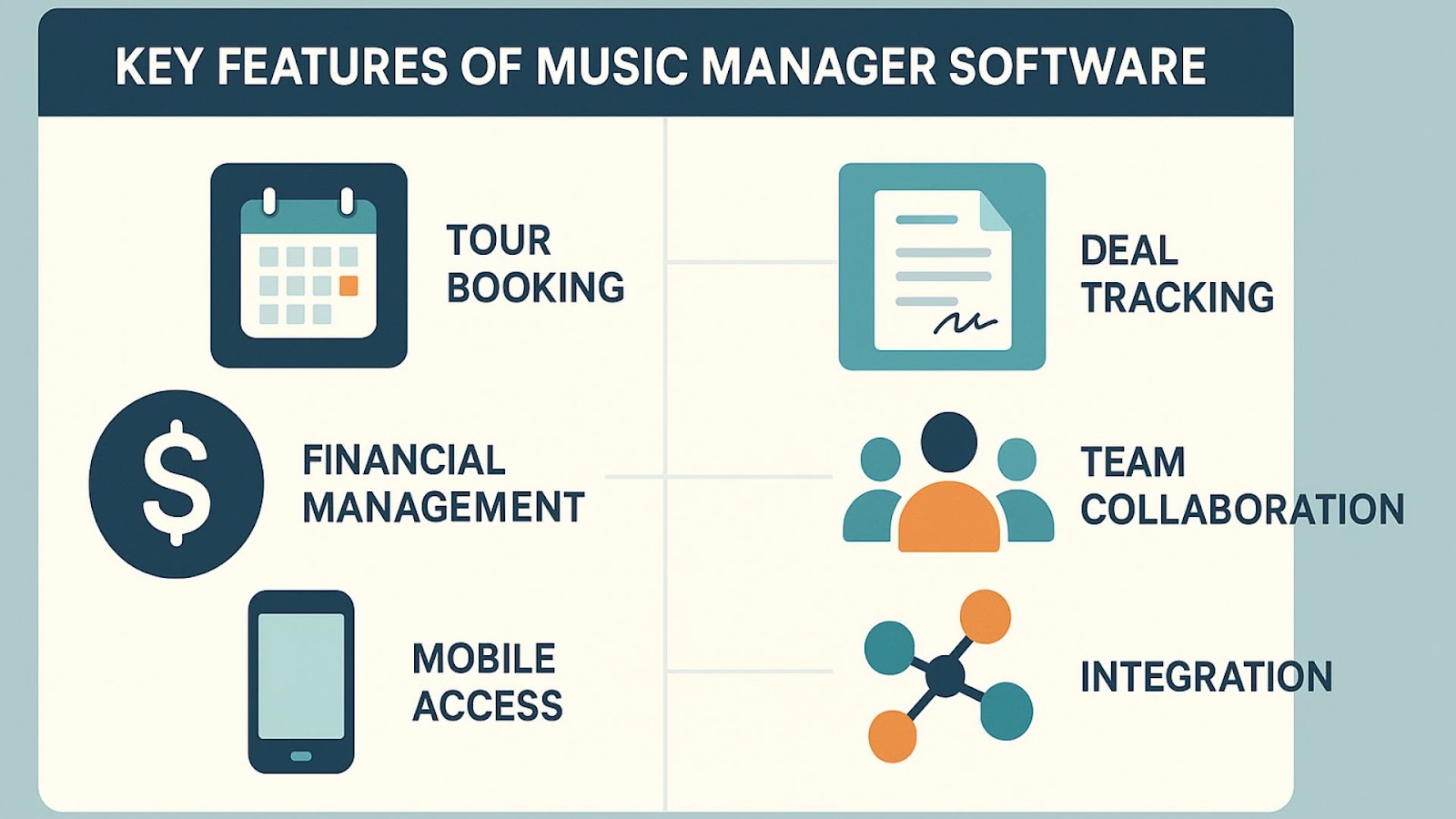
How Does Tour Booking and Venue Management Work?
Professional music management software starts with solid booking capabilities. Look for platforms that offer centralized calendar management, automated hold tracking, and real-time availability updates. The best systems include venue databases with capacity info, tech specs, and historical performance data. In other words, everything you need to know before you even pick up the phone.
Advanced booking features include radius clause management, tour routing optimization, and conflict detection across multiple artists. These tools prevent the nightmare of double-bookings and help you spot opportunities for strategic back-to-back shows or festival pairings that make financial sense.
Why Is Deal Tracking and Contract Management Critical?
Event deal tracking separates the pros from everyone else still scrambling with spreadsheets. Good platforms track every stage of deal negotiation, from initial holds through final settlement. Automated workflows ensure deadlines never slip through the cracks.
Contract management features should include customizable templates, electronic signature integration, and version control. The ability to quickly generate professional offers can be the difference between securing a high-profile booking and losing it to a faster competitor. Advanced event deal tracking systems also maintain historical records of venue relationships and deal terms, helping you negotiate better agreements over time.
What Financial Management and Settlement Tools Do You Need?
Revenue tracking and settlement automation eliminate the tedious number-crunching that eats up your time. Look for software that automatically calculates gross potential, handles percentage splits, and generates detailed financial reports without you having to build formulas in Excel.
Advanced financial features include multi-currency support for international touring, tax reporting automation, and integration with accounting platforms. Real-time financial dashboards help you make informed decisions about tour profitability and budget allocation.
How Important Are Team Collaboration and Communication Features?
Music team collaboration tools have become essential as tours get more complex and teams work remotely. Modern software provides role-based access controls, so your tour manager sees what they need while keeping sensitive financial data away from unnecessary eyes.
Good collaboration features include real-time messaging, task assignment, and progress tracking. The ability to share filtered calendars with different people (showing venues only relevant booking information while giving artists full schedule visibility) cuts down on endless emails.
Why Do You Need Mobile Accessibility and Real-Time Updates?
The music industry never sleeps, and neither do successful managers. Mobile-optimized platforms allow you to negotiate deals from a festival backstage area and confirm shows during airport layovers.

Real-time synchronization ensures everyone works with current information. When a show gets confirmed or a venue changes capacity, everyone involved gets instant updates.
What Integration Capabilities Should You Prioritize?
No single platform handles every aspect of music management. The best software offers robust integration capabilities, connecting with ticketing platforms, accounting systems, and marketing tools to create comprehensive management ecosystems.
Building Your Complete Music Management Tech Stack in 2025
Smart managers build integrated tech stacks that work together. Here’s how to construct a powerful system around your core management platform.
Core Management Platform: Your Command Center
Your music manager software serves as mission control for all operations. Choose a platform like Prism, designed specifically for the music industry, rather than generic event management tools. Industry-specific features like percentage-based deal structures, radius clause management, and settlement automation provide competitive advantages that generic software can’t match.
Professional venue management requires centralized coordination of multiple stakeholders, from artists and agents to venues and promoters. Your core platform should provide real-time visibility into all aspects of tour planning and execution.
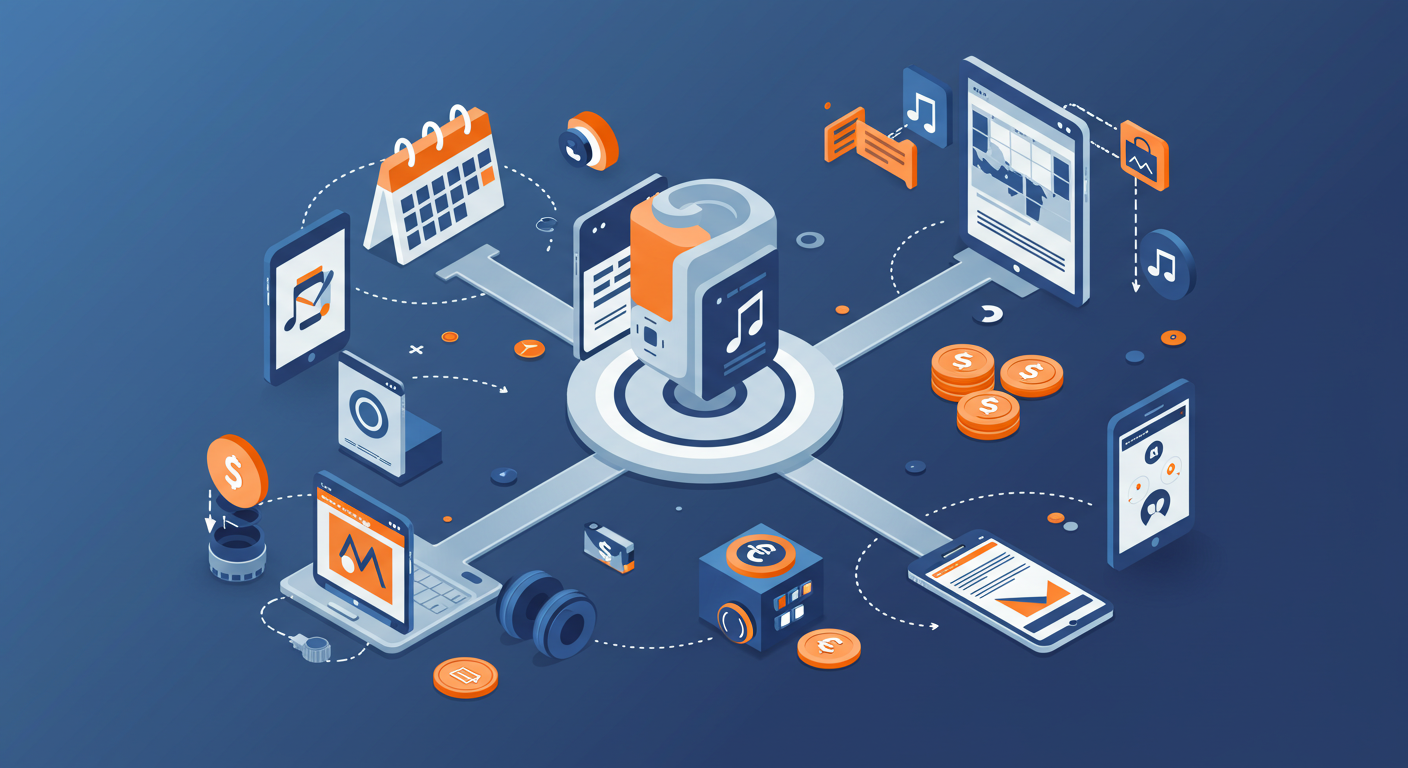
Financial Integration and Payment Processing
Connect your management software with robust accounting platforms like QuickBooks or Xero for seamless financial tracking. Automated data synchronization eliminates manual entry errors and provides real-time profitability insights across all tours and events.
Payment processing integration through Stripe, PayPal, or specialized music industry providers streamlines advance collections and final settlements. Automated payment reminders and split calculations reduce administrative overhead while ensuring timely payments.
Banking integrations enable automatic reconciliation of advances, deposits, and settlement payments. This visibility helps managers maintain accurate cash flow projections and identify potential payment issues before they become problems.
Essential Ticketing Platform Integrations
Modern ticketing platforms offer sophisticated APIs that connect with management software for real-time sales data. Integration with major platforms like Eventbrite, regional ticketing companies, and venue-specific systems provides comprehensive visibility into event performance.
Automated sales reporting eliminates the manual process of requesting box office statements. Real-time ticket sales data enables dynamic decision-making about marketing spend, capacity adjustments, and merchandise planning.
Settlement automation through ticketing integration ensures accurate final payments based on actual sales rather than estimated figures. This precision builds trust with venues and artists while reducing settlement disputes.
Communication and Collaboration Tools
Integrate team communication tools like Slack or Microsoft Teams with your management platform for seamless information flow. Automated notifications about booking changes, payment deadlines, and settlement updates keep everyone informed. The most effective music team collaboration tools sync directly with your core platform, ensuring all communication stays connected to specific shows and deals.
Google Workspace or Microsoft 365 integration enables collaborative document editing for contracts, riders, and marketing materials. Version control and access management ensure sensitive information remains secure while enabling efficient collaboration.
Video conferencing integration facilitates remote meetings with venues, artists, and team members. Calendar synchronization ensures all stakeholders have visibility into meeting schedules and availability.
Enhanced Marketing and Promotion Efforts
Connect social media management tools for coordinated promotional campaigns across multiple platforms. Automated posting schedules and performance tracking help maximize marketing while maintaining consistent brand messaging.
Email marketing platform integration enables targeted fan communications based on tour dates and geographic preferences. Automated campaigns for show announcements, on-sale notifications, and post-show follow-ups increase engagement while reducing manual work.
Press kit and asset management systems ensure consistent brand presentation across all marketing materials. Integration with design tools and content management systems streamlines promotional content creation and distribution.
Travel and Logistics Support
Hotel booking platform integration simplifies accommodation management for touring. Automated booking based on tour schedules and negotiated rates reduces costs while ensuring consistent availability.
Ground transportation coordination through ride-sharing APIs or specialized tour transportation providers ensures reliable logistics. Integration with routing software optimizes travel efficiency and reduces costs.
Equipment rental management systems track gear requirements across multiple venues and ensure technical needs are met. Integration with local suppliers and shipping providers streamlines logistics coordination.
Enhanced Analytics and Reporting Capabilities
Business intelligence tools like Tableau or Power BI can connect with your management platform for advanced analytics. Custom dashboards provide insights into tour profitability, venue performance, and market trends that inform strategic decisions.
Performance tracking measures success across multiple metrics, from ticket sales and merchandise revenue to social media engagement and press coverage. Custom reporting tools support stakeholder-specific communications. Automated reports for artists, venues, and investors provide transparency while reducing administrative overhead.
How to Choose the Right Music Manager Software for Your Needs
The right platform fits how you actually work and can grow with your business. Here are the key factors to consider before making the switch.
How Do You Assess Your Team Size and Workflow Needs?
Solo managers have different needs than large management companies handling multiple artists. Evaluate your current processes, team size, and growth projections before committing to a platform. Comprehensive booking software should scale with your operations rather than constraining growth.
Consider your typical deal volume, tour complexity, and collaboration requirements. Platforms designed for small operations may lack the sophistication needed for major touring, while enterprise solutions might overwhelm solo managers with unnecessary complexity.
What Should You Consider for Budget and ROI Analysis?
Software costs vary based on features, user count, and support levels. Calculate potential time savings, error reduction, and opportunity capture to determine if it’s worth it. Moving beyond spreadsheets often pays for itself within months through improved efficiency and fewer costly mistakes.
Factor in implementation costs, training time, and integration expenses when evaluating options. Cheaper solutions that require extensive customization or lack key integrations often cost more long-term than comprehensive platforms with higher upfront costs.
How Do You Evaluate Integration Requirements and Existing Systems?
Audit your current tech stack before selecting new software. Platforms that integrate with existing tools provide better ROI than solutions requiring wholesale system replacement. Prioritize providers with robust API access and proven integration capabilities.
Consider future integration needs as your operations grow. Software that locks you into proprietary ecosystems can limit flexibility as your needs evolve.
Why Are Scalability and Growth Planning Important?
Choose platforms that can handle your growth without forcing you to start over from scratch. Features like multi-user access, detailed reporting, and solid integrations become essential as you add more artists and bigger tours to your roster.
Look for software companies that actually understand the music industry and keep building features that matter to you. Companies actively developing music-specific tools provide better long-term value than generic event platforms that treat us like any other corporate client.
What Are the Emerging Trends in Music Management Technology?
The music industry evolves fast, and management technology is racing to keep up. These emerging trends will shape how successful managers operate in the coming years.
How Is AI Transforming Music Management Decision Making?
Artificial intelligence offers predictive analytics, automated scheduling, and intelligent recommendations. AI-powered venue management tools can optimize tour routing, predict ticket sales, and identify strategic booking opportunities you might have missed.
Machine learning algorithms analyze historical performance data to recommend venues, pricing strategies, and promotional approaches. These insights help you make smarter decisions that maximize profitability and minimize risk.
What Role Will Blockchain Play in Transparent Settlements?
Blockchain technology promises transparent, immutable records of deal terms and settlement calculations. Smart contracts could automate payment distribution based on predefined terms, reducing disputes and improving trust between parties.
While still emerging, blockchain solutions for music management could revolutionize how complex deals are structured and executed.
How Do You Manage Virtual and Hybrid Events?
Virtual events create new management challenges and opportunities. Modern software must handle hybrid events that combine physical and digital audiences, requiring integrated streaming platforms and virtual audience management tools.
Why Are Real-Time Analytics Critical for Performance Optimization?
Advanced analytics platforms provide real-time insights into tour performance, fan engagement, and market trends. You can adjust marketing spend, modify routing, and optimize pricing based on live data rather than gut feelings and historical assumptions.
Predictive analytics helps identify potential issues before they impact your operations. Early warning systems for low ticket sales, venue capacity problems, or logistical conflicts enable proactive problem-solving instead of constant crisis management.
How Do You Successfully Make the Switch to New Music Management Software?
Making the transition from your current system to new software can feel daunting, but you can minimize disruption and maximize the benefits. Here’s how to handle the switch like a pro.
What’s the Best Approach for Data Migration and System Setup?
Plan data migration carefully to avoid losing critical historical information. Work with software providers to ensure a smooth transition of booking data, contact information, and financial records. Establish data backup procedures before beginning migration.
Test new systems thoroughly with small-scale operations before handling major tours or events.
How Do You Ensure Successful Team Training and Adoption?
Invest in comprehensive training for all team members who will use the new system. Streamlined artist management requires user confidence and competency across all platform features.
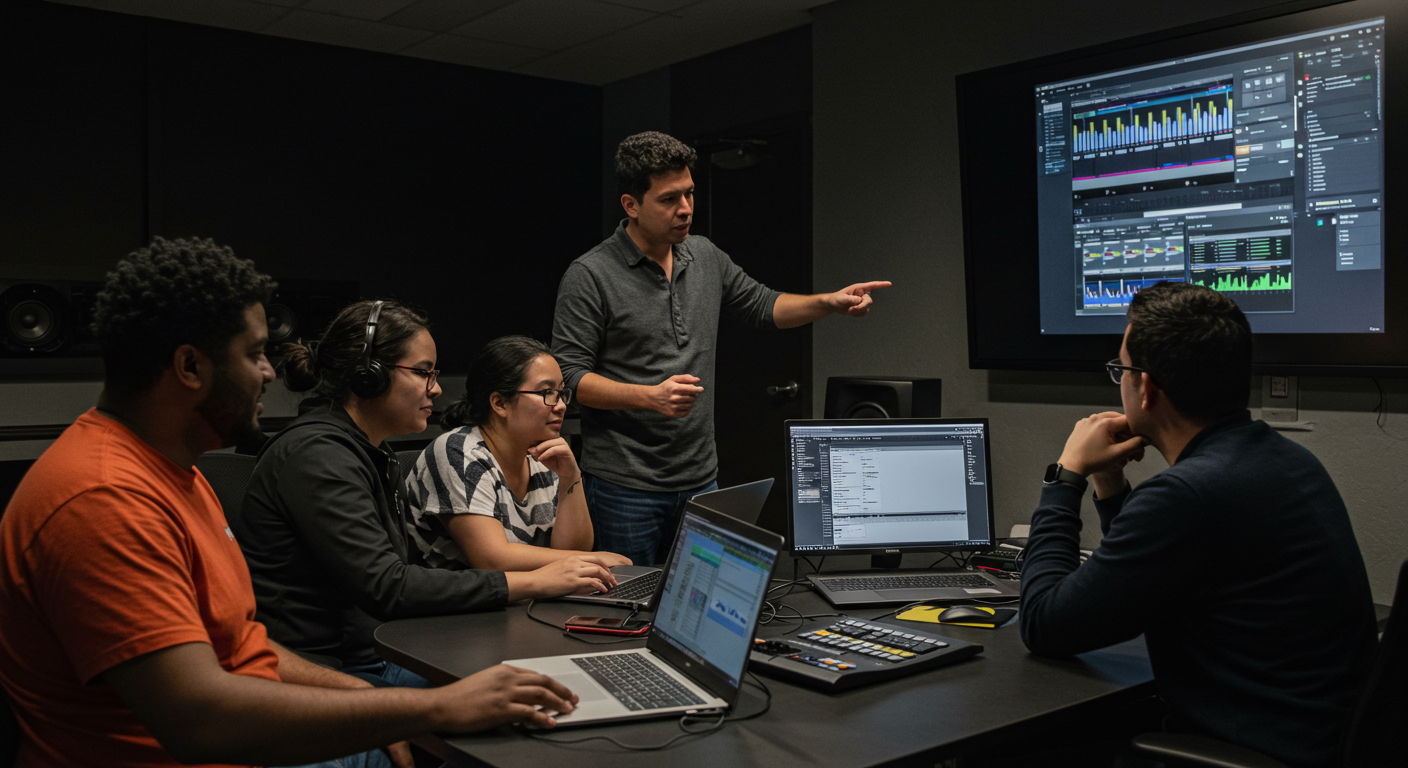
Create internal documentation and standard operating procedures for common tasks. This ensures consistency and reduces dependence on individual knowledge as teams grow or change.
Why Is Performance Monitoring and Optimization Essential?
Establish metrics for measuring how the software stacks up, including time savings, error reduction, and process improvement. Regular performance reviews help identify optimization opportunities and justify continued investment.
Gather feedback from team members, artists, venues, and partners to identify pain points and improvement opportunities. Software providers often incorporate user feedback into development roadmaps.
Frequently Asked Questions
What’s the difference between music manager software and general event management software?
Music manager software includes industry-specific features like percentage-based deal structures, radius clause management, settlement automation, and integration with music industry platforms. General event software lacks these specialized capabilities and often requires extensive customization to handle how we actually do business. Professional artist management software is purpose-built for the unique workflows of managing music careers, tours, and venue relationships.
How much should I expect to pay for professional music manager software?
Pricing varies based on features, user count, and support levels. Entry-level platforms typically offer basic functionality at lower price points, while comprehensive solutions fetch premium pricing. Calculate return on investment based on time savings, fewer errors, and opportunities you’ll actually capture rather than just software costs.
Can small independent managers benefit from professional software?
Many platforms offer scaled pricing for smaller operations. The key is choosing software that can grow with your business rather than limiting your expansion. Features like automation, integration, and mobile access provide value regardless of how many artists you’re managing.
What integrations are most important for music management software?
Priority integrations include accounting platforms (QuickBooks, Xero), ticketing systems (Eventbrite, regional platforms), payment processing (Stripe, PayPal), and communication tools (Slack, email marketing). The specific integrations you need depend on your existing setup and how you prefer to work.
Transform Your Music Management Workflow
The music industry demands better management tools. Traditional methods that worked when tours were simpler now create bottlenecks and put you at a competitive disadvantage. Professional venue management software has become as essential as networking and industry relationships for successful operations. Prism provides the comprehensive music manager software platform that powers thousands of successful tours, festivals, and venue operations worldwide. Get started today and experience the difference professional software makes.

Matt Ford is the founder and CEO of Prism.fm, an Austin-based software company revolutionizing live music event management. With a background in entrepreneurship and a degree from the University of Wisconsin-Madison School of Business, Ford combined his self-taught coding skills with firsthand experience as a concert promoter to address the inefficiencies he observed in the industry. In 2018, he launched Prism.fm, an all-in-one platform designed to streamline operations for venues, promoters, and agencies by replacing cumbersome spreadsheets with integrated tools for booking, financial tracking, and contract management. Under his leadership, Prism.fm has grown significantly, achieving $3 million in annual recurring revenue post-COVID and securing over $15 million in funding . Ford’s commitment to building user-centric solutions has positioned Prism.fm as a trusted partner for over 1,500 venues and promoters worldwide.


